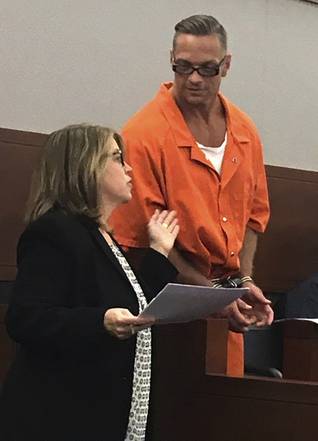
Ken Ritter / AP
Nevada death row inmate Scott Raymond Dozier confers with Lori Teicher, a federal public defender involved in his case, during a Thursday, Aug. 17, 2017, appearance in Clark County District Court in Las Vegas.
Published Thursday, Aug. 24, 2017 | 2:02 p.m.
Updated Thursday, Aug. 24, 2017 | 3:44 p.m.
If a death row inmate wants to die, like he said he does, a challenge on his behalf of an untried three-drug combination for his lethal injection is moot, Nevada's attorney general said in documents submitted to a state court judge Thursday.
Deputies to state Attorney General Adam Laxalt also argue that if Scott Raymond Dozier really wants the state to abandon plans to use the sedative diazepam, the muscle paralytic cisatracurium and the powerful synthetic opioid fentanyl, his legal team needs to offer a "known and available alternative method of execution."
"Dozier himself continues to unequivocally express to this court that he has no desire to challenge his sentence or the method of execution," attorney general lawyers Ann McDermott and Jordan Smith said in the court filing.
Clark County District Court Judge Jennifer Togliatti made no immediate ruling. Dozier's execution is currently scheduled Nov. 14
The judge scheduled responses Tuesday from Dozier, his lawyer Thomas Ericsson and federal public defenders who have filed documents on Dozier's behalf in an effort to ensure that Dozier doesn't experience a death like inmates in what they call recent "botched" lethal injections in Arizona, Florida, Ohio and Oklahoma.
The legal team has raised questions about the order the drugs would be administered, dosages and intended effects, and the qualifications and training of execution team members.
The Nevada Department of Corrections obtained the drugs in late May through the state prisons central pharmacy in Las Vegas from a Tolleson, Arizona, branch of the national company Cardinal Health, according to prisons invoice records. The cost was $482.52.
Prisons spokeswoman Brooke Keast said Cardinal Health is the department's usual prescription drug supplier.
Cardinal Health spokeswoman Corey Kerr didn't directly say whether the pharmaceutical wholesaler knew the intended use for the drugs.
"We hold ourselves to the highest standards of accuracy and safety and have robust controls in place," she said in an email statement. It said the company follows manufacturers' instructions for product distribution.
Dozier told Togliatti last week he isn't really concerned about whether he'll experience pain and suffering.
Now 46, he was convicted of two murders in 2002, in Phoenix and Las Vegas. He was sentenced to death in 2007 in Nevada.
He would become the first inmate put to death in Nevada since 2006, and his execution would be the first use of a new death chamber completed last year at Ely State Prison at a budgeted cost of $860,000.
The American Civil Liberties Union of Nevada has raised the specter of "torture or a lingering death" in calls for state prison officials to make public "critical details" about the process to be used during Dozier's execution.
The ACLU noted that the diazepam-cisatracurium-fentanyl combination has never been used in an execution in the United States.
